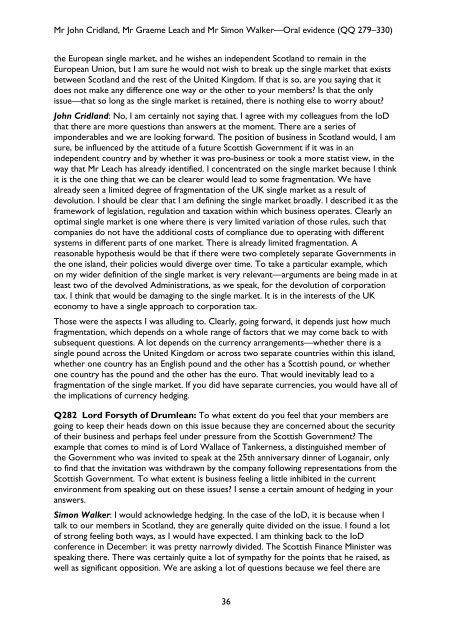SELECT COMMITTEE ON ECONOMIC AFFAIRS - Parliament
SELECT COMMITTEE ON ECONOMIC AFFAIRS - Parliament
SELECT COMMITTEE ON ECONOMIC AFFAIRS - Parliament
Create successful ePaper yourself
Turn your PDF publications into a flip-book with our unique Google optimized e-Paper software.
Mr John Cridland, Mr Graeme Leach and Mr Simon Walker—Oral evidence (QQ 279–330)<br />
the European single market, and he wishes an independent Scotland to remain in the<br />
European Union, but I am sure he would not wish to break up the single market that exists<br />
between Scotland and the rest of the United Kingdom. If that is so, are you saying that it<br />
does not make any difference one way or the other to your members? Is that the only<br />
issue—that so long as the single market is retained, there is nothing else to worry about?<br />
John Cridland: No, I am certainly not saying that. I agree with my colleagues from the IoD<br />
that there are more questions than answers at the moment. There are a series of<br />
imponderables and we are looking forward. The position of business in Scotland would, I am<br />
sure, be influenced by the attitude of a future Scottish Government if it was in an<br />
independent country and by whether it was pro-business or took a more statist view, in the<br />
way that Mr Leach has already identified. I concentrated on the single market because I think<br />
it is the one thing that we can be clearer would lead to some fragmentation. We have<br />
already seen a limited degree of fragmentation of the UK single market as a result of<br />
devolution. I should be clear that I am defining the single market broadly. I described it as the<br />
framework of legislation, regulation and taxation within which business operates. Clearly an<br />
optimal single market is one where there is very limited variation of those rules, such that<br />
companies do not have the additional costs of compliance due to operating with different<br />
systems in different parts of one market. There is already limited fragmentation. A<br />
reasonable hypothesis would be that if there were two completely separate Governments in<br />
the one island, their policies would diverge over time. To take a particular example, which<br />
on my wider definition of the single market is very relevant—arguments are being made in at<br />
least two of the devolved Administrations, as we speak, for the devolution of corporation<br />
tax. I think that would be damaging to the single market. It is in the interests of the UK<br />
economy to have a single approach to corporation tax.<br />
Those were the aspects I was alluding to. Clearly, going forward, it depends just how much<br />
fragmentation, which depends on a whole range of factors that we may come back to with<br />
subsequent questions. A lot depends on the currency arrangements—whether there is a<br />
single pound across the United Kingdom or across two separate countries within this island,<br />
whether one country has an English pound and the other has a Scottish pound, or whether<br />
one country has the pound and the other has the euro. That would inevitably lead to a<br />
fragmentation of the single market. If you did have separate currencies, you would have all of<br />
the implications of currency hedging.<br />
Q282 Lord Forsyth of Drumlean: To what extent do you feel that your members are<br />
going to keep their heads down on this issue because they are concerned about the security<br />
of their business and perhaps feel under pressure from the Scottish Government? The<br />
example that comes to mind is of Lord Wallace of Tankerness, a distinguished member of<br />
the Government who was invited to speak at the 25th anniversary dinner of Loganair, only<br />
to find that the invitation was withdrawn by the company following representations from the<br />
Scottish Government. To what extent is business feeling a little inhibited in the current<br />
environment from speaking out on these issues? I sense a certain amount of hedging in your<br />
answers.<br />
Simon Walker: I would acknowledge hedging. In the case of the IoD, it is because when I<br />
talk to our members in Scotland, they are generally quite divided on the issue. I found a lot<br />
of strong feeling both ways, as I would have expected. I am thinking back to the IoD<br />
conference in December: it was pretty narrowly divided. The Scottish Finance Minister was<br />
speaking there. There was certainly quite a lot of sympathy for the points that he raised, as<br />
well as significant opposition. We are asking a lot of questions because we feel there are<br />
36

















